UK Obesity Crisis: Government Policies and Public Health Impact
VerifiedAdded on 2023/06/08
|8
|2072
|299
Report
AI Summary
This report examines the public health issue of obesity in the UK, its causes, and its effects on the population, including increased risks of type 2 diabetes, high blood pressure, and cardiovascular diseases. It discusses government policies and programs aimed at reducing obesity rates, such as the Better Health campaign, and their impact on different ethnicities and minority groups. The report also references NICE guidelines and explores the economic burden of obesity on the NHS. It concludes that while government policies are beneficial in promoting healthier lifestyles and providing healthcare facilities, obesity remains a significant concern requiring continued efforts to address dietary habits and encourage physical activity. Desklib provides access to similar reports and solved assignments for students.
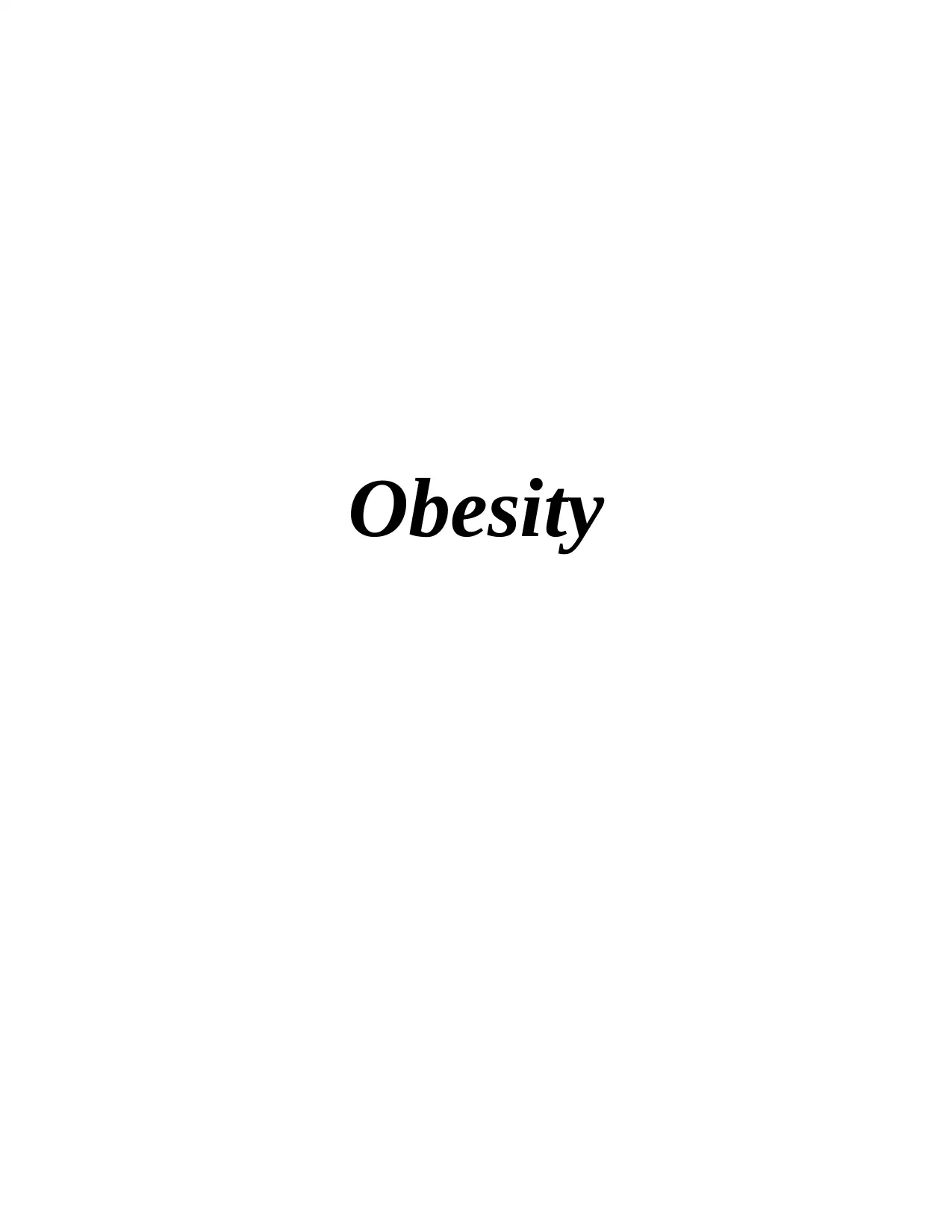
Obesity
Paraphrase This Document
Need a fresh take? Get an instant paraphrase of this document with our AI Paraphraser

Table of Contents
INTRODUCTION...........................................................................................................................1
MAIN BODY...................................................................................................................................1
CONCLUSION................................................................................................................................1
REFERENCES................................................................................................................................2
INTRODUCTION...........................................................................................................................1
MAIN BODY...................................................................................................................................1
CONCLUSION................................................................................................................................1
REFERENCES................................................................................................................................2
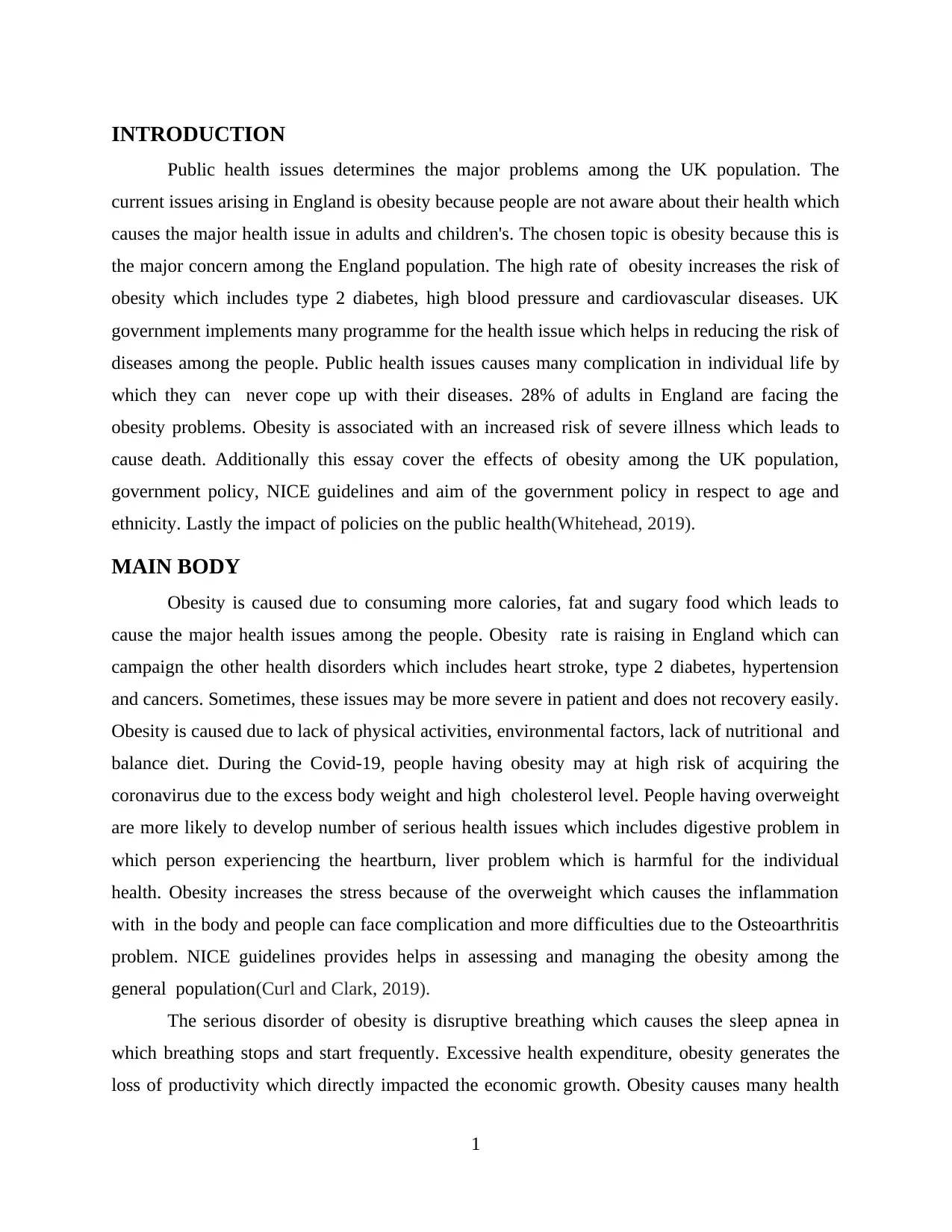
INTRODUCTION
Public health issues determines the major problems among the UK population. The
current issues arising in England is obesity because people are not aware about their health which
causes the major health issue in adults and children's. The chosen topic is obesity because this is
the major concern among the England population. The high rate of obesity increases the risk of
obesity which includes type 2 diabetes, high blood pressure and cardiovascular diseases. UK
government implements many programme for the health issue which helps in reducing the risk of
diseases among the people. Public health issues causes many complication in individual life by
which they can never cope up with their diseases. 28% of adults in England are facing the
obesity problems. Obesity is associated with an increased risk of severe illness which leads to
cause death. Additionally this essay cover the effects of obesity among the UK population,
government policy, NICE guidelines and aim of the government policy in respect to age and
ethnicity. Lastly the impact of policies on the public health(Whitehead, 2019).
MAIN BODY
Obesity is caused due to consuming more calories, fat and sugary food which leads to
cause the major health issues among the people. Obesity rate is raising in England which can
campaign the other health disorders which includes heart stroke, type 2 diabetes, hypertension
and cancers. Sometimes, these issues may be more severe in patient and does not recovery easily.
Obesity is caused due to lack of physical activities, environmental factors, lack of nutritional and
balance diet. During the Covid-19, people having obesity may at high risk of acquiring the
coronavirus due to the excess body weight and high cholesterol level. People having overweight
are more likely to develop number of serious health issues which includes digestive problem in
which person experiencing the heartburn, liver problem which is harmful for the individual
health. Obesity increases the stress because of the overweight which causes the inflammation
with in the body and people can face complication and more difficulties due to the Osteoarthritis
problem. NICE guidelines provides helps in assessing and managing the obesity among the
general population(Curl and Clark, 2019).
The serious disorder of obesity is disruptive breathing which causes the sleep apnea in
which breathing stops and start frequently. Excessive health expenditure, obesity generates the
loss of productivity which directly impacted the economic growth. Obesity causes many health
1
Public health issues determines the major problems among the UK population. The
current issues arising in England is obesity because people are not aware about their health which
causes the major health issue in adults and children's. The chosen topic is obesity because this is
the major concern among the England population. The high rate of obesity increases the risk of
obesity which includes type 2 diabetes, high blood pressure and cardiovascular diseases. UK
government implements many programme for the health issue which helps in reducing the risk of
diseases among the people. Public health issues causes many complication in individual life by
which they can never cope up with their diseases. 28% of adults in England are facing the
obesity problems. Obesity is associated with an increased risk of severe illness which leads to
cause death. Additionally this essay cover the effects of obesity among the UK population,
government policy, NICE guidelines and aim of the government policy in respect to age and
ethnicity. Lastly the impact of policies on the public health(Whitehead, 2019).
MAIN BODY
Obesity is caused due to consuming more calories, fat and sugary food which leads to
cause the major health issues among the people. Obesity rate is raising in England which can
campaign the other health disorders which includes heart stroke, type 2 diabetes, hypertension
and cancers. Sometimes, these issues may be more severe in patient and does not recovery easily.
Obesity is caused due to lack of physical activities, environmental factors, lack of nutritional and
balance diet. During the Covid-19, people having obesity may at high risk of acquiring the
coronavirus due to the excess body weight and high cholesterol level. People having overweight
are more likely to develop number of serious health issues which includes digestive problem in
which person experiencing the heartburn, liver problem which is harmful for the individual
health. Obesity increases the stress because of the overweight which causes the inflammation
with in the body and people can face complication and more difficulties due to the Osteoarthritis
problem. NICE guidelines provides helps in assessing and managing the obesity among the
general population(Curl and Clark, 2019).
The serious disorder of obesity is disruptive breathing which causes the sleep apnea in
which breathing stops and start frequently. Excessive health expenditure, obesity generates the
loss of productivity which directly impacted the economic growth. Obesity causes many health
1
⊘ This is a preview!⊘
Do you want full access?
Subscribe today to unlock all pages.

Trusted by 1+ million students worldwide
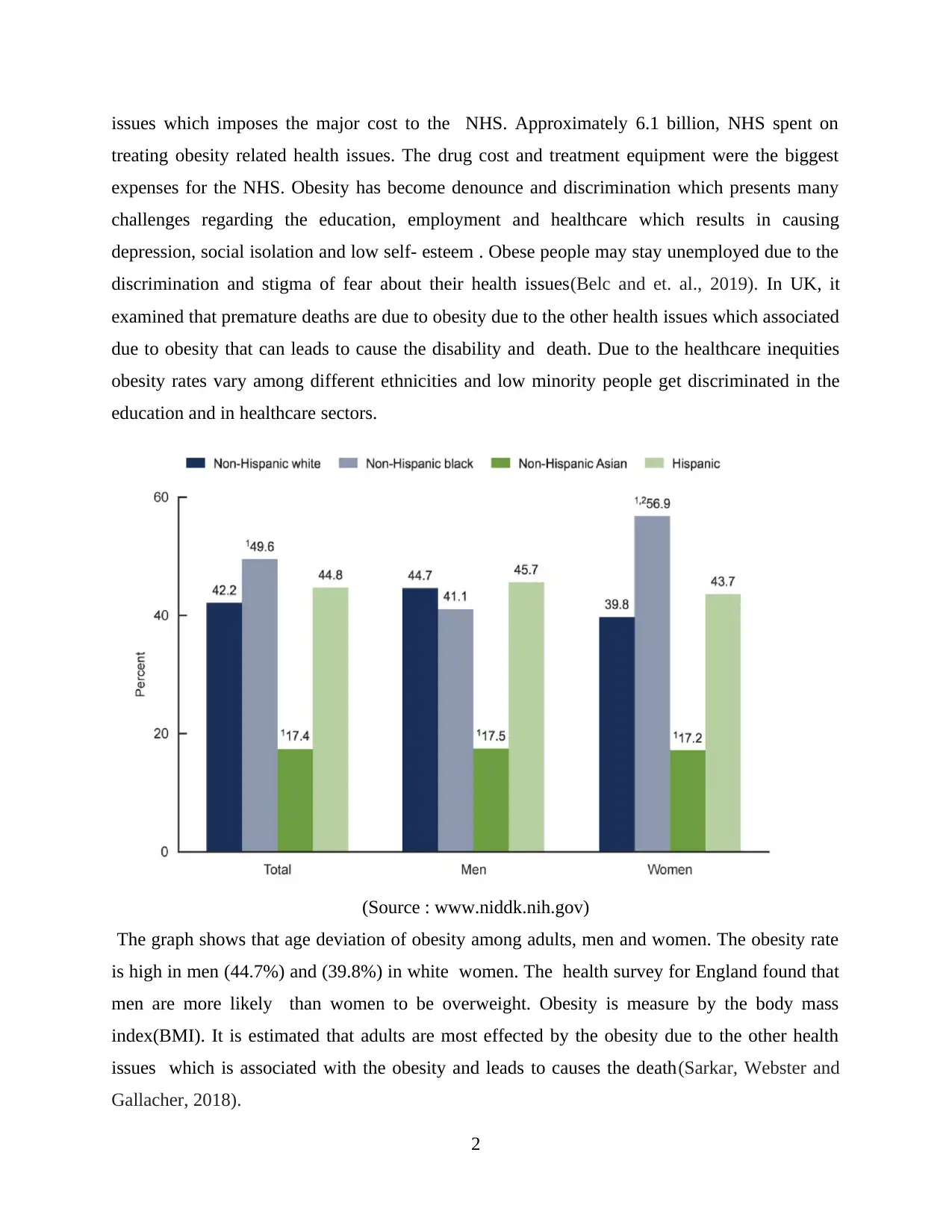
issues which imposes the major cost to the NHS. Approximately 6.1 billion, NHS spent on
treating obesity related health issues. The drug cost and treatment equipment were the biggest
expenses for the NHS. Obesity has become denounce and discrimination which presents many
challenges regarding the education, employment and healthcare which results in causing
depression, social isolation and low self- esteem . Obese people may stay unemployed due to the
discrimination and stigma of fear about their health issues(Belc and et. al., 2019). In UK, it
examined that premature deaths are due to obesity due to the other health issues which associated
due to obesity that can leads to cause the disability and death. Due to the healthcare inequities
obesity rates vary among different ethnicities and low minority people get discriminated in the
education and in healthcare sectors.
(Source : www.niddk.nih.gov)
The graph shows that age deviation of obesity among adults, men and women. The obesity rate
is high in men (44.7%) and (39.8%) in white women. The health survey for England found that
men are more likely than women to be overweight. Obesity is measure by the body mass
index(BMI). It is estimated that adults are most effected by the obesity due to the other health
issues which is associated with the obesity and leads to causes the death(Sarkar, Webster and
Gallacher, 2018).
2
treating obesity related health issues. The drug cost and treatment equipment were the biggest
expenses for the NHS. Obesity has become denounce and discrimination which presents many
challenges regarding the education, employment and healthcare which results in causing
depression, social isolation and low self- esteem . Obese people may stay unemployed due to the
discrimination and stigma of fear about their health issues(Belc and et. al., 2019). In UK, it
examined that premature deaths are due to obesity due to the other health issues which associated
due to obesity that can leads to cause the disability and death. Due to the healthcare inequities
obesity rates vary among different ethnicities and low minority people get discriminated in the
education and in healthcare sectors.
(Source : www.niddk.nih.gov)
The graph shows that age deviation of obesity among adults, men and women. The obesity rate
is high in men (44.7%) and (39.8%) in white women. The health survey for England found that
men are more likely than women to be overweight. Obesity is measure by the body mass
index(BMI). It is estimated that adults are most effected by the obesity due to the other health
issues which is associated with the obesity and leads to causes the death(Sarkar, Webster and
Gallacher, 2018).
2
Paraphrase This Document
Need a fresh take? Get an instant paraphrase of this document with our AI Paraphraser
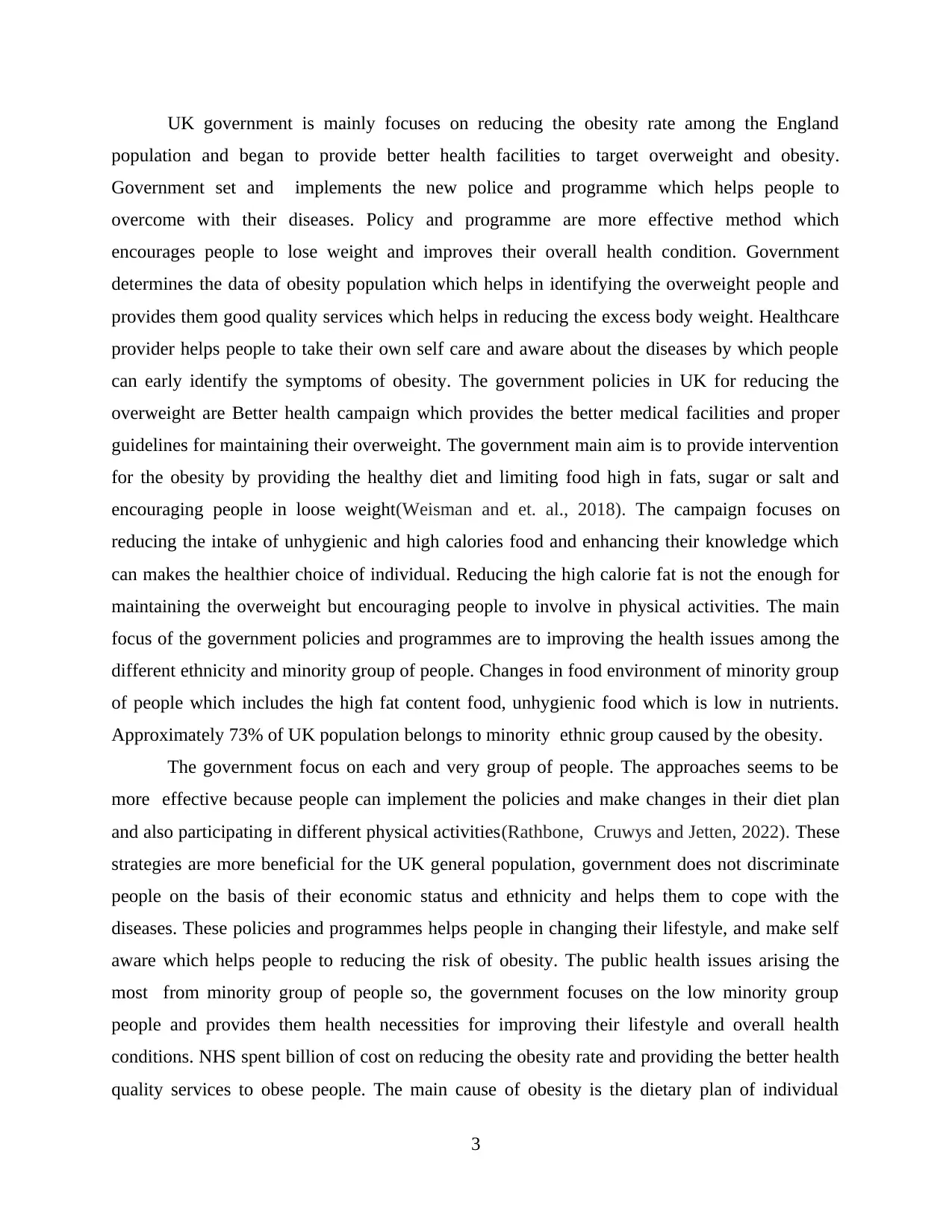
UK government is mainly focuses on reducing the obesity rate among the England
population and began to provide better health facilities to target overweight and obesity.
Government set and implements the new police and programme which helps people to
overcome with their diseases. Policy and programme are more effective method which
encourages people to lose weight and improves their overall health condition. Government
determines the data of obesity population which helps in identifying the overweight people and
provides them good quality services which helps in reducing the excess body weight. Healthcare
provider helps people to take their own self care and aware about the diseases by which people
can early identify the symptoms of obesity. The government policies in UK for reducing the
overweight are Better health campaign which provides the better medical facilities and proper
guidelines for maintaining their overweight. The government main aim is to provide intervention
for the obesity by providing the healthy diet and limiting food high in fats, sugar or salt and
encouraging people in loose weight(Weisman and et. al., 2018). The campaign focuses on
reducing the intake of unhygienic and high calories food and enhancing their knowledge which
can makes the healthier choice of individual. Reducing the high calorie fat is not the enough for
maintaining the overweight but encouraging people to involve in physical activities. The main
focus of the government policies and programmes are to improving the health issues among the
different ethnicity and minority group of people. Changes in food environment of minority group
of people which includes the high fat content food, unhygienic food which is low in nutrients.
Approximately 73% of UK population belongs to minority ethnic group caused by the obesity.
The government focus on each and very group of people. The approaches seems to be
more effective because people can implement the policies and make changes in their diet plan
and also participating in different physical activities(Rathbone, Cruwys and Jetten, 2022). These
strategies are more beneficial for the UK general population, government does not discriminate
people on the basis of their economic status and ethnicity and helps them to cope with the
diseases. These policies and programmes helps people in changing their lifestyle, and make self
aware which helps people to reducing the risk of obesity. The public health issues arising the
most from minority group of people so, the government focuses on the low minority group
people and provides them health necessities for improving their lifestyle and overall health
conditions. NHS spent billion of cost on reducing the obesity rate and providing the better health
quality services to obese people. The main cause of obesity is the dietary plan of individual
3
population and began to provide better health facilities to target overweight and obesity.
Government set and implements the new police and programme which helps people to
overcome with their diseases. Policy and programme are more effective method which
encourages people to lose weight and improves their overall health condition. Government
determines the data of obesity population which helps in identifying the overweight people and
provides them good quality services which helps in reducing the excess body weight. Healthcare
provider helps people to take their own self care and aware about the diseases by which people
can early identify the symptoms of obesity. The government policies in UK for reducing the
overweight are Better health campaign which provides the better medical facilities and proper
guidelines for maintaining their overweight. The government main aim is to provide intervention
for the obesity by providing the healthy diet and limiting food high in fats, sugar or salt and
encouraging people in loose weight(Weisman and et. al., 2018). The campaign focuses on
reducing the intake of unhygienic and high calories food and enhancing their knowledge which
can makes the healthier choice of individual. Reducing the high calorie fat is not the enough for
maintaining the overweight but encouraging people to involve in physical activities. The main
focus of the government policies and programmes are to improving the health issues among the
different ethnicity and minority group of people. Changes in food environment of minority group
of people which includes the high fat content food, unhygienic food which is low in nutrients.
Approximately 73% of UK population belongs to minority ethnic group caused by the obesity.
The government focus on each and very group of people. The approaches seems to be
more effective because people can implement the policies and make changes in their diet plan
and also participating in different physical activities(Rathbone, Cruwys and Jetten, 2022). These
strategies are more beneficial for the UK general population, government does not discriminate
people on the basis of their economic status and ethnicity and helps them to cope with the
diseases. These policies and programmes helps people in changing their lifestyle, and make self
aware which helps people to reducing the risk of obesity. The public health issues arising the
most from minority group of people so, the government focuses on the low minority group
people and provides them health necessities for improving their lifestyle and overall health
conditions. NHS spent billion of cost on reducing the obesity rate and providing the better health
quality services to obese people. The main cause of obesity is the dietary plan of individual
3
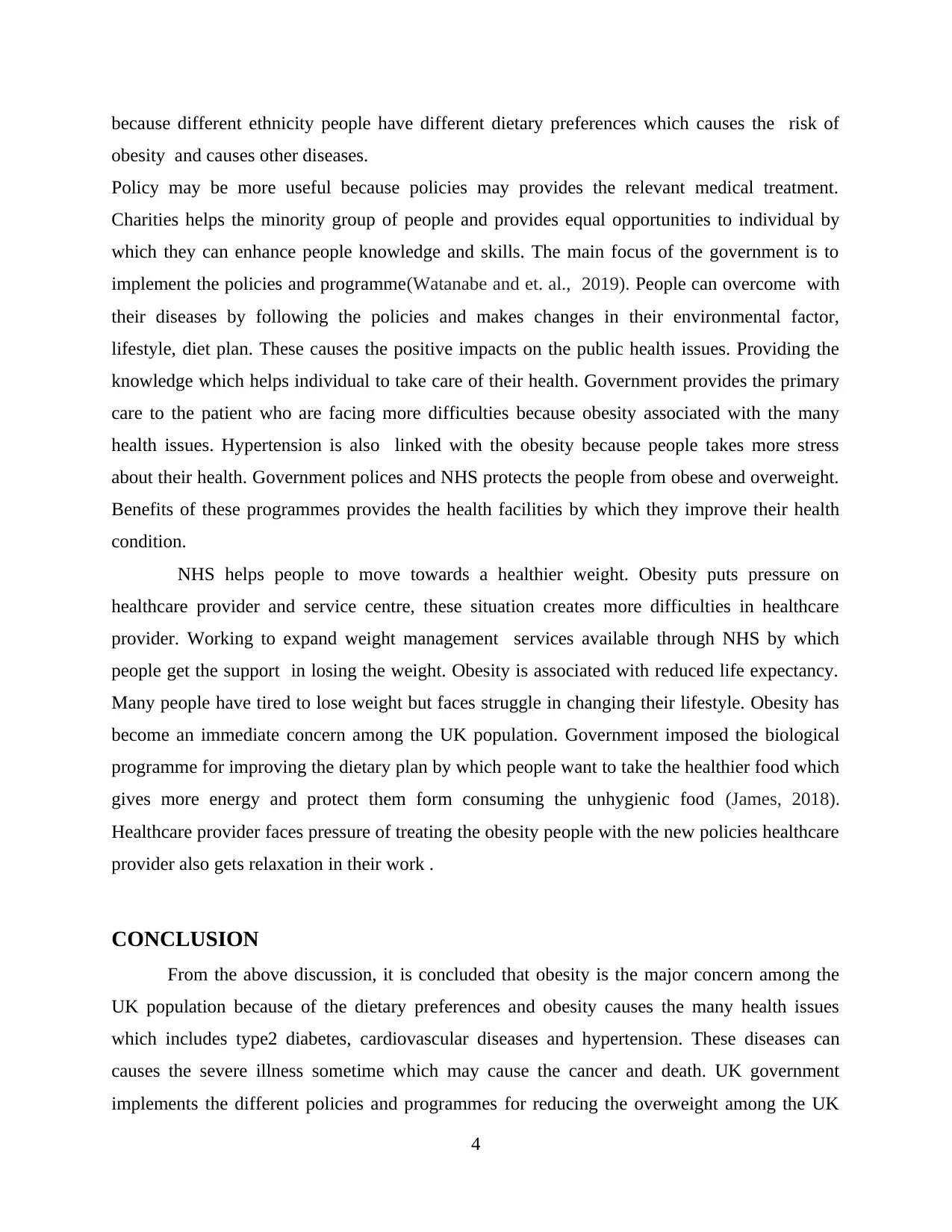
because different ethnicity people have different dietary preferences which causes the risk of
obesity and causes other diseases.
Policy may be more useful because policies may provides the relevant medical treatment.
Charities helps the minority group of people and provides equal opportunities to individual by
which they can enhance people knowledge and skills. The main focus of the government is to
implement the policies and programme(Watanabe and et. al., 2019). People can overcome with
their diseases by following the policies and makes changes in their environmental factor,
lifestyle, diet plan. These causes the positive impacts on the public health issues. Providing the
knowledge which helps individual to take care of their health. Government provides the primary
care to the patient who are facing more difficulties because obesity associated with the many
health issues. Hypertension is also linked with the obesity because people takes more stress
about their health. Government polices and NHS protects the people from obese and overweight.
Benefits of these programmes provides the health facilities by which they improve their health
condition.
NHS helps people to move towards a healthier weight. Obesity puts pressure on
healthcare provider and service centre, these situation creates more difficulties in healthcare
provider. Working to expand weight management services available through NHS by which
people get the support in losing the weight. Obesity is associated with reduced life expectancy.
Many people have tired to lose weight but faces struggle in changing their lifestyle. Obesity has
become an immediate concern among the UK population. Government imposed the biological
programme for improving the dietary plan by which people want to take the healthier food which
gives more energy and protect them form consuming the unhygienic food (James, 2018).
Healthcare provider faces pressure of treating the obesity people with the new policies healthcare
provider also gets relaxation in their work .
CONCLUSION
From the above discussion, it is concluded that obesity is the major concern among the
UK population because of the dietary preferences and obesity causes the many health issues
which includes type2 diabetes, cardiovascular diseases and hypertension. These diseases can
causes the severe illness sometime which may cause the cancer and death. UK government
implements the different policies and programmes for reducing the overweight among the UK
4
obesity and causes other diseases.
Policy may be more useful because policies may provides the relevant medical treatment.
Charities helps the minority group of people and provides equal opportunities to individual by
which they can enhance people knowledge and skills. The main focus of the government is to
implement the policies and programme(Watanabe and et. al., 2019). People can overcome with
their diseases by following the policies and makes changes in their environmental factor,
lifestyle, diet plan. These causes the positive impacts on the public health issues. Providing the
knowledge which helps individual to take care of their health. Government provides the primary
care to the patient who are facing more difficulties because obesity associated with the many
health issues. Hypertension is also linked with the obesity because people takes more stress
about their health. Government polices and NHS protects the people from obese and overweight.
Benefits of these programmes provides the health facilities by which they improve their health
condition.
NHS helps people to move towards a healthier weight. Obesity puts pressure on
healthcare provider and service centre, these situation creates more difficulties in healthcare
provider. Working to expand weight management services available through NHS by which
people get the support in losing the weight. Obesity is associated with reduced life expectancy.
Many people have tired to lose weight but faces struggle in changing their lifestyle. Obesity has
become an immediate concern among the UK population. Government imposed the biological
programme for improving the dietary plan by which people want to take the healthier food which
gives more energy and protect them form consuming the unhygienic food (James, 2018).
Healthcare provider faces pressure of treating the obesity people with the new policies healthcare
provider also gets relaxation in their work .
CONCLUSION
From the above discussion, it is concluded that obesity is the major concern among the
UK population because of the dietary preferences and obesity causes the many health issues
which includes type2 diabetes, cardiovascular diseases and hypertension. These diseases can
causes the severe illness sometime which may cause the cancer and death. UK government
implements the different policies and programmes for reducing the overweight among the UK
4
⊘ This is a preview!⊘
Do you want full access?
Subscribe today to unlock all pages.

Trusted by 1+ million students worldwide
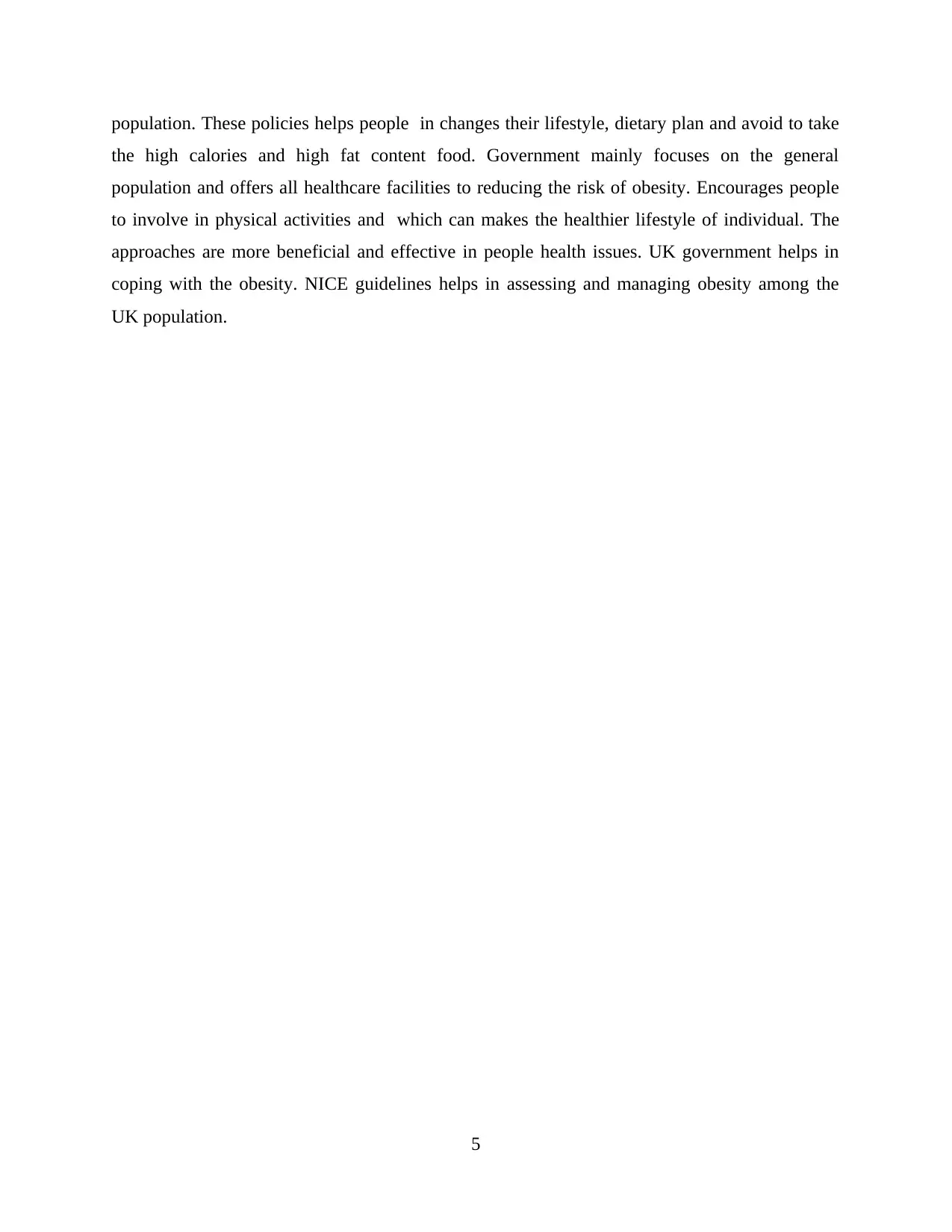
population. These policies helps people in changes their lifestyle, dietary plan and avoid to take
the high calories and high fat content food. Government mainly focuses on the general
population and offers all healthcare facilities to reducing the risk of obesity. Encourages people
to involve in physical activities and which can makes the healthier lifestyle of individual. The
approaches are more beneficial and effective in people health issues. UK government helps in
coping with the obesity. NICE guidelines helps in assessing and managing obesity among the
UK population.
5
the high calories and high fat content food. Government mainly focuses on the general
population and offers all healthcare facilities to reducing the risk of obesity. Encourages people
to involve in physical activities and which can makes the healthier lifestyle of individual. The
approaches are more beneficial and effective in people health issues. UK government helps in
coping with the obesity. NICE guidelines helps in assessing and managing obesity among the
UK population.
5
Paraphrase This Document
Need a fresh take? Get an instant paraphrase of this document with our AI Paraphraser
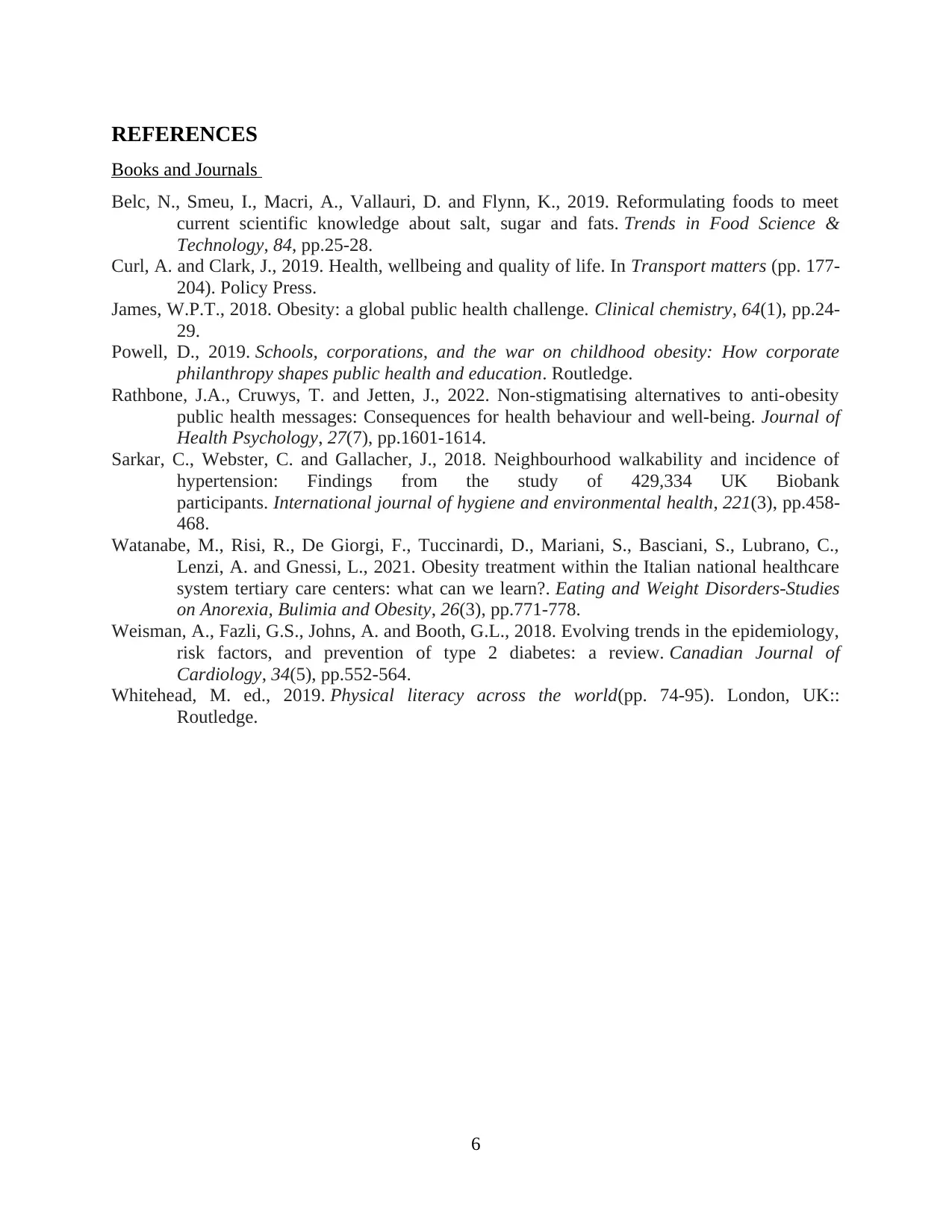
REFERENCES
Books and Journals
Belc, N., Smeu, I., Macri, A., Vallauri, D. and Flynn, K., 2019. Reformulating foods to meet
current scientific knowledge about salt, sugar and fats. Trends in Food Science &
Technology, 84, pp.25-28.
Curl, A. and Clark, J., 2019. Health, wellbeing and quality of life. In Transport matters (pp. 177-
204). Policy Press.
James, W.P.T., 2018. Obesity: a global public health challenge. Clinical chemistry, 64(1), pp.24-
29.
Powell, D., 2019. Schools, corporations, and the war on childhood obesity: How corporate
philanthropy shapes public health and education. Routledge.
Rathbone, J.A., Cruwys, T. and Jetten, J., 2022. Non-stigmatising alternatives to anti-obesity
public health messages: Consequences for health behaviour and well-being. Journal of
Health Psychology, 27(7), pp.1601-1614.
Sarkar, C., Webster, C. and Gallacher, J., 2018. Neighbourhood walkability and incidence of
hypertension: Findings from the study of 429,334 UK Biobank
participants. International journal of hygiene and environmental health, 221(3), pp.458-
468.
Watanabe, M., Risi, R., De Giorgi, F., Tuccinardi, D., Mariani, S., Basciani, S., Lubrano, C.,
Lenzi, A. and Gnessi, L., 2021. Obesity treatment within the Italian national healthcare
system tertiary care centers: what can we learn?. Eating and Weight Disorders-Studies
on Anorexia, Bulimia and Obesity, 26(3), pp.771-778.
Weisman, A., Fazli, G.S., Johns, A. and Booth, G.L., 2018. Evolving trends in the epidemiology,
risk factors, and prevention of type 2 diabetes: a review. Canadian Journal of
Cardiology, 34(5), pp.552-564.
Whitehead, M. ed., 2019. Physical literacy across the world(pp. 74-95). London, UK::
Routledge.
6
Books and Journals
Belc, N., Smeu, I., Macri, A., Vallauri, D. and Flynn, K., 2019. Reformulating foods to meet
current scientific knowledge about salt, sugar and fats. Trends in Food Science &
Technology, 84, pp.25-28.
Curl, A. and Clark, J., 2019. Health, wellbeing and quality of life. In Transport matters (pp. 177-
204). Policy Press.
James, W.P.T., 2018. Obesity: a global public health challenge. Clinical chemistry, 64(1), pp.24-
29.
Powell, D., 2019. Schools, corporations, and the war on childhood obesity: How corporate
philanthropy shapes public health and education. Routledge.
Rathbone, J.A., Cruwys, T. and Jetten, J., 2022. Non-stigmatising alternatives to anti-obesity
public health messages: Consequences for health behaviour and well-being. Journal of
Health Psychology, 27(7), pp.1601-1614.
Sarkar, C., Webster, C. and Gallacher, J., 2018. Neighbourhood walkability and incidence of
hypertension: Findings from the study of 429,334 UK Biobank
participants. International journal of hygiene and environmental health, 221(3), pp.458-
468.
Watanabe, M., Risi, R., De Giorgi, F., Tuccinardi, D., Mariani, S., Basciani, S., Lubrano, C.,
Lenzi, A. and Gnessi, L., 2021. Obesity treatment within the Italian national healthcare
system tertiary care centers: what can we learn?. Eating and Weight Disorders-Studies
on Anorexia, Bulimia and Obesity, 26(3), pp.771-778.
Weisman, A., Fazli, G.S., Johns, A. and Booth, G.L., 2018. Evolving trends in the epidemiology,
risk factors, and prevention of type 2 diabetes: a review. Canadian Journal of
Cardiology, 34(5), pp.552-564.
Whitehead, M. ed., 2019. Physical literacy across the world(pp. 74-95). London, UK::
Routledge.
6
1 out of 8
Related Documents
Your All-in-One AI-Powered Toolkit for Academic Success.
+13062052269
info@desklib.com
Available 24*7 on WhatsApp / Email
![[object Object]](/_next/static/media/star-bottom.7253800d.svg)
Unlock your academic potential
Copyright © 2020–2026 A2Z Services. All Rights Reserved. Developed and managed by ZUCOL.





